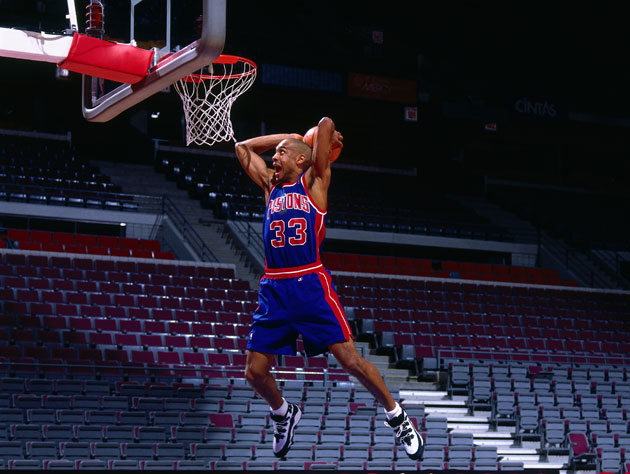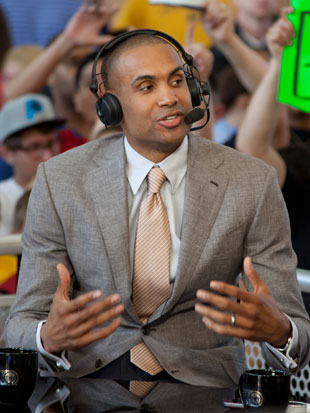
It was over 13 years ago that Grant Hill injured his left ankle late in his last regular season with the Detroit Pistons. Playing in the postseason a month later after rushing back from the injury, Hill broke the same ankle. This then led to a spiral of rehabilitation, re-injury and even serious infection as Hill attempted to return to his previous, All-Star form, resulting in a respected career as a role player beginning in his final season with Orlando in 2006-07.
Somehow, Hill lasted for 13 years following that injury, despite all the setbacks. And he finally retired on Saturday, even knowing that a good medical staff and right situation could still put him in the right place to be a contributor on a good team in 2013-14. The move was likely spurred on by Hill’s final season with the Los Angeles Clipper, his first since 2005-06 to be riddled by injury. By midseason (even with the Clippers humming along) it was obvious that Hill had just about had enough.
Which is a shame, because we never felt like we got enough of Grant Hill. Even after 18 seasons.
It’s not just that a generation of basketball viewers only know Grant Hill as either the injury liability or savvy role player, it’s that his presence in the nascent days of the NBA-following internet makes it so his initial brilliance with the Detroit Pistons is too often overlooked. In an era that took the air out of the ball on every possession, with lax handchecking rules, Grant Hill acted as a mini-LeBron James for seven killer seasons with the Detroit Pistons.
His finest hour came in 1999-00, his last year with the team. It was his most telling year in a number of different ways, though, and not all of his tells helped observers identify some wonderful hand that had been dealt Hill’s way.
A free agent in the summer of 2000, Hill was bombarded with questions at every stop in the Pistons’ season about his potential impending flight from Detroit, in ways that fans that watched “LeBron James’ Decision Tour: 2009-10” will understand. James courted that attention, though, as he worked his way through his mid-20s. Hill was too polite and too thoughtful to put an end to any talk, which only fueled fire in the several cities that had begun clearing cap space for the decision of Grant’s own after the lockout in early 1999.
Somehow, his game went to another level that year, despite working in a clumsy offense under coach George Irvine. Hill averaged 25.8 points and a combined 11.8 rebounds/assists for the Pistons, and though Detroit was no threat to win a title that year, they were on track to make a good playoff showing until March, when Hill was originally told he had a sprained ankle. Hill didn’t quite believe the diagnosis, but faced with pressure from the team, its fans, and the press for potentially taking it easy with an injury on the eve of the much awaited free agent turn, Hill returned too early and joined his team in time for the playoffs.
 It turns out that Hill was playing on a broken ankle. This much was confirmed after Hill had to leave Game 2 of his team’s series against the Miami Heat. Grant went on to sign with Orlando in the offseason, and facing the same batch of pressure (no fan base wants to see its team’s new maximum-salaried player on crutches on the bench to start the season), Hill returned too early to start 2000-01. And he returned too early in 2001-02, while we’re at it, as Grant had to shut it down just a month into his season.
It turns out that Hill was playing on a broken ankle. This much was confirmed after Hill had to leave Game 2 of his team’s series against the Miami Heat. Grant went on to sign with Orlando in the offseason, and facing the same batch of pressure (no fan base wants to see its team’s new maximum-salaried player on crutches on the bench to start the season), Hill returned too early to start 2000-01. And he returned too early in 2001-02, while we’re at it, as Grant had to shut it down just a month into his season.
By 2002-03 Grant Hill could only drive to his left, a result of all those left ankle surgeries turning his right foot into the only healthy one to push off of. He was 30, three-years into a max contract that saw him suit up for just 18 games, and watching as teammate Tracy McGrady expounded every bit of energy that he could just to keep what was a top-heavy Magic team even with Hill competitive.
Things somehow got worse from there. Hill developed a staph infection from yet another ankle surgery in 2002. The diagnosis could have proven fatal, and Grant needed six months’ worth of treatment just to return to full health. The Magic kept his condition private, something Hill agreed to, but a revelation of his treatment could have possibly saved their one-time savior from unearned scorn as he sat out the bulk of yet another season.
After Orlando declined to bring Hill back in 2007 to serve as a mentor to Dwight Howard, the former All-Star hopped on with the Phoenix Suns, rejuvenating his career in the desert while working with what is considered to be the NBA’s top medical staff. Hill didn’t win a title in Phoenix, but he did miss an average of just six games per season over his five years there, remarkable for someone his age, working with the ankle that created all this misfortune.
Now, he’s packing it in. Understandable not just for his age and injury history, but for the fact that Grant Hill can contribute quite a bit more to society in 2013-14, in private or public terms, than he could as a well-regarded role player on a pretty good team next season. This is why calls for him to become an NBA broadcaster, coach, or even team general manager would be undercutting his potential.
For 2013-14, he’s probably just best served being a dutiful husband and father, at home all day for the first time since entering the NBA in 1994. It would be a good first step, for someone that long ago earned the right to make his own decisions about important things like these.
No comments:
Post a Comment